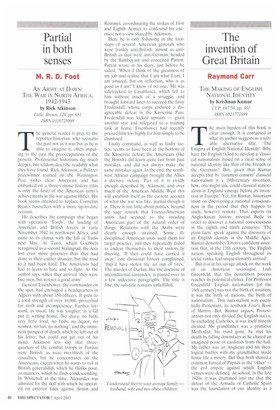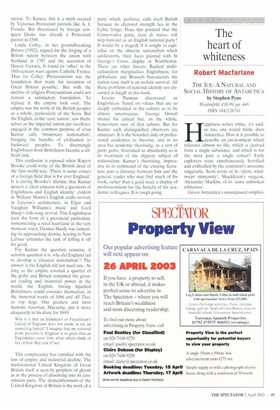The invention of Great Britain
Raymond Carr
THE MAKING OF ENGLISH NATIONAL IDENTITY by Krishnan Kumar CUP, £47.50, pp. 381 ISBN 0521771889 The main burden of this book is clear enough. It is contained in what its author suggests as a suitable alternative title, 'The Enigma of English National Identity'. Why have the English failed to develop a 'classical nationalism' based on a clear sense of national identity like that of the French or the Germans? But, given that Kumar accepts that by 'common consent' classical nationalism is a 19th-century invention, how, one might ask, could classical nationalism in England emerge before its invention in Europe? Yet, for Kumar, historians insist on discovering a national consciousness in the period that they happen to study, however remote. Thus experts on Anglo-Saxon history misread Bede in order to discover a national consciousness in the eighth and ninth centuries. 'The plain facts' speak against the discovery of an English identity in the Middle Ages, Kumar demolishes Elton's confident assertion that, in the 15th century, 'the English nation, speaking English throughout its social ranks, had unquestionably arrived'.
But it is in his savage attack on the work of an American sociologist, Liah Greenfeld, that this demolition process reaches its polemical climax. For Professor Greenfeld 'English nationalism [of the 16th century] was not the birth of a nation; it was the birth of nations, the birth of nationalism'. This nationalism was essentially Protestant, its textbook Foxe's Book of Martyrs. But, Kumar argues, Protestantism not only divided the English natioil by excluding Catholics, it was itself bitterly divided. My grandfather was a primitive Methodist; his mind gone, he met his death by falling downstairs as he chased an imagined posse of cardinals from the hall. My father was an Anglican and his theological battles with my grandfather made home life a misery. But they both shared a common hatred of Papists as the 'other' — the evil empire against which English virtues were defined. At school, in the late 1920s. it was drummed into me that the defeat of the Armada of Catholic Spain was the foundation of our identity as a nation. To Kumar, this is a myth created by Victorian Protestant patriots like A. J. Froude. But threatened by foreign conquest Drake was already a Protestant patriot in 1588.
Linda Colley, in her groundbreaking Britons (1992), argued for the forging of a British nation between the union with Scotland in 1707 and the accession of Queen Victoria, it found its 'other' in the 18th-century wars against Catholic France. Thus for Colley 'Protestantism was the foundation that made the invention of Great Britain possible'. But with the decline of religion Protestantism could not remain a satisfactory foundation. To replace it, the empire took over. The empire was the work of the British peoples as a whole, particularly of the Scots. But the English, as the 'core nation', saw themselves as the imperial nation par excellence engaged in the common purpose of what Kumar calls 'missionary nationalism', bringing the benefits of civilisation to backward peoples. To disentangle Englishness from Britishness became a difficult task.
This confusion is exposed when Rupert Brooke could write of the British dead of the first world war, 'There is some corner of a foreign field that is for ever England.' It is during Brooke's lifetime that Kumar detects a 'clear concern with a questions of Englishness and English identity' evident in William Morris's English crafts revival, in Lutyens's architecture, in Elgar and Vaughan Williams's music and Cecil Sharp's folk-song revival. This Englishness took the form of a provincial patriotism, romanticising a rural heartland at the very moment when Thomas Hardy was lamenting its approaching demise, leaving to New Labour urbanites the task of killing it off for good. For Kumar the question remains, if sensible question it is, why did England fail to develop a 'classical nationalism'? The answer is the English did not need one. As long as the empire covered a quarter of the globe and Britain remained the greatest trading and industrial power in the world, the English, having hijacked Britishness, could consider themselves, in the immortal words of 1066 and All That, as top dogs. Our greatest and most humane historian, Macaulay, put it more eloquently in his diary for 1849:
Why is it that an Irishman's or Frenchman's hatted of England cloes not excite in me an answering hatred? I imagine that my national pride prevents it. England is so great that an Englishman cares little what others think of her or how they talk of her.
This complacency has vanished with the loss of empire and industrial decline. The multinational United Kingdom of Great Britain itself is seen by prophets of gloom as in the process of dissolving into its constituent parts. The dismemberment of the United Kingdom of Britain is the work of a
party which, perforce, calls itself British because its electoral strength lies in the Celtic fringe. Does this portend that the Conservative party, ,faute de mieux, will step forward as an English national party? It would he a tragedy if it sought to capitalise on the obscene nationalism which adolescents, their faces painted with St George's Cross, display at Wimbledon. There are other threats. Radical multiculturalism marginalises Englishness; for globalisers and Brussels bureaucrats the nation state itself is an archaic survival. All these problems of national identity are discussed at length in this book. Jeremy Paxman discovered an Englishness 'based on values that are so deeply embedded in the culture as to be almost unconscious'. George Orwell shared his critical but, on the whole, benevolent view of that culture. But for Kumar such distinguished observers are amateurs. It is the bounden duty of professional academics to theorise, and in no area has academic theorising, as a sort of party game, flourished so abundantly as in its treatment of the slippery subject of nationalism. Kumar's theorising, impressive in its command of the existing literature puts a distance between him and the general reader who may find much of his book, rather than a good read, a display of professionalism for the benefit of his academic colleagues. It is tough going.



































































 Previous page
Previous page